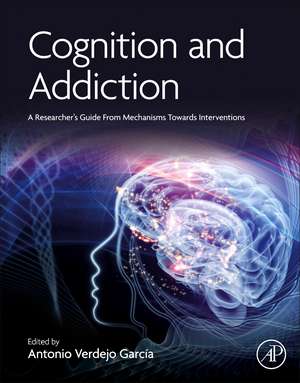Cognition and Addiction: A Researcher’s Guide from Mechanisms Towards Interventions
Editat de Antonio Verdejo Garcíaen Limba Engleză Hardback – 30 sep 2019
- Examines cognitive neuroscience advances in addiction theory, including both substance and behavioral addictions
- Discusses primary principles of cutting-edge assessment, phenotyping and treatment tools
- Includes detailed chapters on neuro-epidemiology and genetic imaging
Preț: 928.50 lei
Preț vechi: 1233.73 lei
-25% Nou
Puncte Express: 1393
Preț estimativ în valută:
177.69€ • 185.28$ • 147.68£
177.69€ • 185.28$ • 147.68£
Carte tipărită la comandă
Livrare economică 14-28 martie
Preluare comenzi: 021 569.72.76
Specificații
ISBN-13: 9780128152980
ISBN-10: 0128152982
Pagini: 442
Dimensiuni: 216 x 276 x 30 mm
Editura: ELSEVIER SCIENCE
ISBN-10: 0128152982
Pagini: 442
Dimensiuni: 216 x 276 x 30 mm
Editura: ELSEVIER SCIENCE
Public țintă
Primary: researchers in cognitive neuroscience, psychology and related fields. Secondary: advanced students and physiciansCuprins
Section 1: COGNITIVE PRINCIPLES OF ADDICTION1. Cognition – the interface between nature and nurture in addiction2. From impulses to compulsions3. Dual models of addiction4. Decision-making in addiction5. Social cognition in addiction6. A neurocognitive model of addiction comorbidities
Section 2: COGNITIVE PHENOTYPING OF SUBSTANCE AND BEHAVIORAL ADDICTIONS7. Alcohol and tobacco8. Marijuana and cannabinoids9. Stimulants10. Opiates11. Gambling12. Internet and other disruptive technologies
Section 3: COGNITIVE TRAINING 13. Cognitive Bias Modification14. Working Memory Training15. Inhibitory Control Training16. Goal Management Training17. Brain Stimulation18. Cognitive Enhancers
Section 4: NEW VISTAS19. Population neuroscience in addiction20. Neuro-epidemiology21. Big data22. Modeling addiction recovery23. Clinical translation and implementation science for novel cognitive interventions24. Synergistic opportunities in combined interventions
Section 2: COGNITIVE PHENOTYPING OF SUBSTANCE AND BEHAVIORAL ADDICTIONS7. Alcohol and tobacco8. Marijuana and cannabinoids9. Stimulants10. Opiates11. Gambling12. Internet and other disruptive technologies
Section 3: COGNITIVE TRAINING 13. Cognitive Bias Modification14. Working Memory Training15. Inhibitory Control Training16. Goal Management Training17. Brain Stimulation18. Cognitive Enhancers
Section 4: NEW VISTAS19. Population neuroscience in addiction20. Neuro-epidemiology21. Big data22. Modeling addiction recovery23. Clinical translation and implementation science for novel cognitive interventions24. Synergistic opportunities in combined interventions
